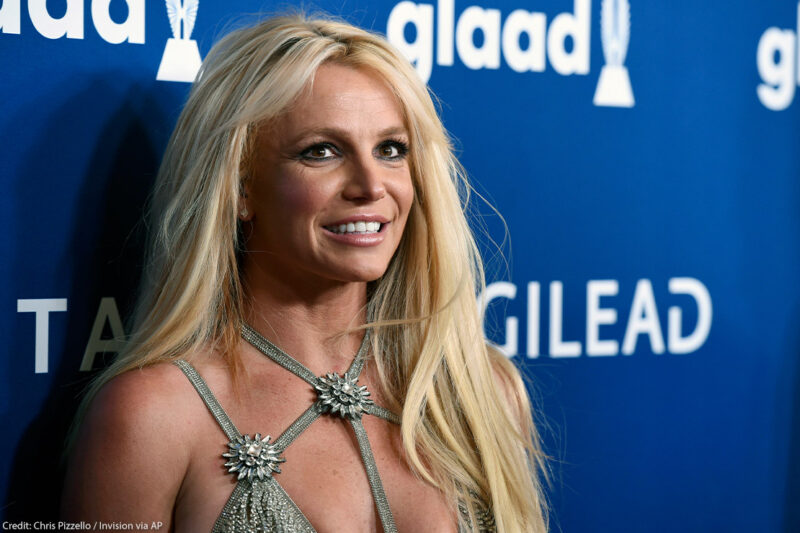How Conservatorship Threatens Britney Spears’ Civil Rights


UPDATE: After 13 years, Britney’s conservatorship finally ended in November 2021, restoring her right to make decisions about her own life. But there are still over 1 million people with disabilities living under some form of conservatorship or guardianship in the U.S. — people who deserve access to their civil liberties, too.
Britney Spears did it again — the pop singer has recently been in the news for her ongoing conservatorship and civil liberties battle with her father, Jamie Spears. This past week, Britney asked a California court to keep her father from being her conservator and having broad control over her life decisions and career. But what exactly is a conservatorship, and what are the implications of it? We sat down with Zoe Brennan-Krohn, staff attorney with the ACLU’s Disability Rights Project, to discuss Britney, conservatorship, and why this is a disability rights issue on our radar.
Q: Can you briefly explain Britney Spears’ situation, and the implications of her conservatorship case?
Britney Spears is subject to a court-imposed conservatorship (in most other states this structure is referred to as a guardianship). This means that a court has determined she is unable to provide properly for her food, clothing, or shelter. The court has then granted other people — her conservators — the legal right to make decisions for her. News reports indicate that this has been the case for Britney since 2008. While we do not know the details of Spears’ conservatorship, in general, conservators like those in her case have the ability to make decisions about all aspects of her life — where she lives, where and how she spends her money, what medications she takes, who she spends time with, and other decisions.
Q: Can you please break down, what is conservatorship? What does it mean?
Conservatorship means the court is taking away the civil liberties from one person and giving them to someone else. Sometimes it’s ALL of that person’s civil rights and civil liberties, and sometimes it's partial. But it is the court weighing into the person’s life and saying you, as a person with a disability, are no longer able to make decisions about yourself and livelihood — such as where you live, and how you support and feed yourself — and we are putting someone else in charge of making those decisions. Because it’s such an extreme step to take, it’s really supposed to be a last resort. And once a court has put a person under a conservatorship, only a court can lift that conservatorship.
Q: Why is the ACLU just weighing in on this now?
The ACLU has a long history of advocating for the rights of people with disabilities to live independent, self-directed lives as active members of their communities. Our concerns about conservatorship and guardianship are part of that commitment: ensuring that people with disabilities retain their civil rights and liberties and a belief that disabled people are protected through the exercise — rather than the removal — of these rights.
This issue is getting attention right now because of Britney Spears’ fame. But she is only one of untold thousands nationwide under or at risk of guardianship or conservatorship.The ACLU has advocated for expanding supported decision-making, an alternative to conservatorship or guardianship where people with disabilities can choose trusted support people to help them direct their lives, without court intervention or loss of civil rights.
Q: Why is conservatorship a disability rights issue?
People only end up under conservatorships or guardianships if a court identifies them as having disabilities. This includes people with psychiatric disabilities, developmental or intellectual disabilities, age-related disabilities like dementia, and other types of disabilities.
Fighting against the unnecessary and dangerous removal of disabled peoples’ civil rights and civil liberties is a core belief of the ACLU’s disability rights work. This is not to say that all conservatorships are bad or wrong or unnecessary — conservatorships are complex and individual processes. But the ease with which disabled people can be stripped of their rights, and the extraordinary difficulties they face getting those rights back, is a systemic disability rights issue about which we have serious concerns.
Q: How do people get into conservatorships? How does conservatorship limit a person’s civil liberties/rights?
Typically a conservatorship happens when somebody comes into court saying they think this person needs guardianship or conservatorship. Often, it can be the parents or relatives of a person with a disability, or sometimes it can happen after a school or doctor tells the parents that they should get a conservatorship. What’s especially dangerous about conservatorships is they are typically viewed as harmless, including by courts and judges who impose them routinely. This is part of society’s paternalism and infantilization of people with disabilities. But in fact, conservatorships are a serious and often permanent arrangement.
Conservatorships limit a person’s civil liberties, which we at the ACLU of course view as a core concern. But beyond that, conservatorships don’t necessarily actually make people safer: They can result in financial, physical, or emotional abuse.
Q: What laws or policies exist that protect someone from a conservatorship of this kind? What would the legal process to lift the conservatorship look like?
Most state laws have some safeguards in place. In California for example, the court is supposed to consider which less restrictive alternatives to conservatorship have been tried before imposing a conservatorship. The judge should ask a person seeking conservatorship, “What else have you tried? Have you tried supported decision-making? Have you tried joint bank accounts or money management classes? Have you tried a system of text reminders to make sure the person gets to their medical appointments?” And if the person seeking conservatorship hasn’t tried these options, the judge should deny the conservatorship. There should only be a conservatorship if these other options have been tried in good faith and really aren’t working. But in reality, conservatorships are often imposed even when other supports and alternatives might work.
To lift a conservatorship, the laws are different state by state, but a conservatee can go to the court to say they want this changed or lifted, and the court should consider it. However, it's very difficult. Judges are very reluctant to lift conservatorships, and only the judge has the power to do so. You aren’t necessarily entitled to a lawyer to help you get out of a conservatorship either. And in many cases, it is virtually impossible for a person to access the courts, especially if their conservator doesn’t agree that the conservatorship should be lifted. How would the person — who cannot choose where they live or where they go or who they associate with — figure out how to get before a judge to challenge that they cannot make these decisions? It can be a Catch-22. As a general matter, it’s much easier to get into conservatorships than to get out of them.
Q: We don’t know Britney’s diagnosis or details about her particular situation. How do we know this case is a civil rights/liberties issue?
We don’t know if Britney Spears identifies herself as a person with disabilities, or what, if any, diagnoses she has received. But by virtue of being under a conservatorship, we know that the court has determined that she is disabled, and has stripped away her civil rights because of that disability. So it’s inherently a civil rights/civil liberties issue.
What we don’t know is what the info the court had, what Britney has said about what she wants specifically, what other options have been tried, or what her lawyers have said. So while it’s possible that this is an example of a thoughtful conservatorship that was implemented as the last resort and is being reviewed carefully, thoroughly, and regularly, that is not the norm for conservatorships, and it appears inconsistent with what we see of Britney publicly. Our view is that in general, conservatorships should be viewed with skepticism and used as a last resort. In most cases, it’s done routinely and without substantive engagement.
Q: Are there alternatives to conservatorship that can help keep a person with a disability and others safe, without limiting their rights?
Yes, there are plenty of alternatives to conservatorship, and they are important. Everyone — with and without disabilities — uses supports to make decisions. We ask friends for advice, research issues, and make lists of pros and cons. These same options should be available to people with disabilities. Powers of attorney, advanced medical directives, shared control over finances, and supported decision-making are all options for disabled people to keep their rights and get support in making decisions, just like nondisabled people do.
Q: What would you say to people that think the conservatorship in Britney’s case is for the best? And that the risks of harm (emotional/material/physical) to herself and/or others are too high?
We don’t know all of the risks and benefits at play, so we can’t speak to the specifics of her case. But we do know that the conservatorship itself also has risks. The risks in conservatorship can include financial, physical, and emotional abuse. And even when there is no abuse, conservatorships limit a person’s ability to advocate for themselves, learn from their decisions and mistakes, and grow and develop. There is a risk in being told that your opinions, your likes and dislikes, don’t matter — it makes it harder to stand up to abuse or neglect. So in any conservatorship, including this, we would want to know that the real risks (and benefits) of both conservatorship and its alternatives have been seriously weighed.
Q: Do ALL people with disabilities have a right to lead self-directed lives and retain their civil rights? Shouldn’t it be on a case by case determination?
All people with disabilities have a right to lead self-directed lives and retain their civil rights as much as possible. What that looks like will be different for different people — some have significant support needs for some or all of their lives. But as a society we need to find ways to support people with disabilities and recognize that they are individuals with a full range of human experiences and preferences who have the right to exercise their civil liberties.


